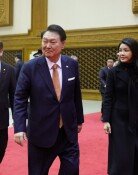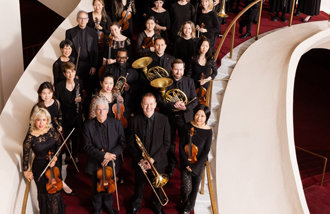Will Domestic Consumption Pick Up?
Expectations are getting higher that domestic consumption will recover from the prolonged recession as the composite stock price index and KOSDAQ index are improving and sales of department stores are increasing with the start of the New Year.
However, many say that it is too soon to predict a recovery of domestic consumption as consumer sentiment is yet to be revitalized and the service sector is still sluggish.
According to the department store sector on January 23, Lotte Department Stores revenue during the January regular sale period (January 7 to 22) excluding food sales increased 9.7 percent from the same period last year. Revenues of Hyundai Department Store and Shinsegye Department Store during the same period rose 6.0 percent and 8.1 percent, respectively.
Meanwhile, the amount of money that newly flowed into customers deposit accounts and stock-related indirect investment products in the stock market reportedly reached 2.2 trillion won.
In addition, the amount of money paid by credit card during the fourth quarter of last year (October to December) was the highest figure in eight quarters since the fourth quarter of 2002.
Some say that such phenomena is stemming from the expectations of investors and consumers that the economy will turn around.
Lee Hun-jae, vice prime minister and minister of finance and economy, said on January 21, It remains to be seen, but added, The economy got off to a good start from the start of the New Year, expressing his expectations on economic revitalization.
Although there are more and more positive signals including some indexes, others point out that it is premature to predict an economic turnaround. That is because most service sectors, including the restaurant and taxi businesses, are suffering from an extreme recession, while some distribution sectors starting from department stores and discount stores are seeing an increasing number of customers.
Song Tae-jung, a senior economist at the LG Economic Research Institute, said, Although some signs of economic recovery are seen, it will take more time to find out whether such tendencies could become a trend of the whole economy.
Is the Depressed Economy Starting to Pick Up?-
Revenue of department stores continuously posted year-on-year negative growth from February 2003 to November 2004 except for two months (August 2003 and February 2004).
But, analysts say that consumer sentiment is gradually improving as the stock market has been brisk since the New Year, and as the revenue of department stores rises.
As for January sale of department stores, sales showed a rise after a long recession, excluding the food sector, which is hard to directly compare with the last year (as sales for New Years Day were included in the records of last years sale period).
Lotte Department Store saw a 45 percent increase in the sales of fur clothes thanks to continuing cold weather during the sale period, and a 15 percent rise in the sales of mens wear, including jumpers and coats.
Shinsegye Department Store also posted a sales increase in many sectors including womens suits (17.6 percent), overseas luxury goods (19.2 percent) and mens casual wear and suits (26 percent). Hyundai Department Store also recorded a considerable increase in sales in womens suits (44.7 percent), mens suits (22 percent) and bedclothes and home appliances (25 percent).
Some analysts say that such improvements in department store sales are a result of an improvement in the financial status of middle-class salary earners thanks to large bonuses from major conglomerates and banks last year, and from recovering consumer sentiment due to the revitalized KODAQ market this year, which has a large share of individual investors.
The domestic sales record of passenger cars in December last year also showed a 5.3 percent increase with 80,700 units sold, showing improvement after a long period of sluggish sales.
Confusing Economic Indexes-
Lee Gun-hyuk, an advisor to the minister of finance and economy, publicized data on last years credit card sales on January 21, saying that they gradually started to improve in the third quarter (July to September) and rapidly increased in the fourth quarter (October to December).
He explained that such a phenomenon amounts to a good omen which shows that the credit card bubble, the main element of the sluggish domestic consumption, disappeared to a degree, and that the spending power of consumers is picking up.
However, last years retail sales did not show a clear sign of improvement over the third and fourth quarters, according to Industrial Activities statistics released by the National Statistical Office.
Lee Seung-woo, director of the economic policy bureau of the ministry of finance and economy, explained, It is meaningful that positive economic indexes are starting to appear after only negative indexes were reported.
There Is a Long Way to Go-
All in all, experts say that it will take more time for overall consumer sentiment to pick up, although consumption increasing, mainly among the high-income classes.
The Survey on Consumer Expectations in December 2004 released by the National Statistical Office showed a four-month consecutive drop in the consumer expectation index, with an 85.1 score in December. The Consumer Expectation Index is the expectation of consumers for the economy, their financial status, and their consumption expenses over the next six months, in comparison with the present. An index score exceeding 100 means that there are many households who expect the future economic situation to be positive.
In short, to recover overall consumption, a circle consisting of revitalization of investment, job creation, increased household income, and consumption recovery should be established.
Upper Classes, The Messenger of Consumption Recovery, Loosen Their Purse Strings-
Consumer sentiment among high-income earners is showing a degree of pickup amid overall sluggishness in consumption sentiment. According to the National Statistical Offices newly released consumer expectation study in December 2004, the consumer expectation index of high-income classes with monthly incomes higher than four million won hit the lowest index figure ever in November, but jumped in December to 93.1, the first increase in three months.
Revenues of department stores that cater to high-income shoppers are showing a bit of improvement in January. Increased sales of fur clothes and luxury brands have been higher than those of other goods.
Experts point out that the recovery of the high classes consumer sentiment is encouraging in that they are a driving force behind change when consumption reaches a turning point.
Furthermore, the number of large passenger cars sold in December last year reached 12,388 units, a 39.6 percent increase year-on-year, and sales of medium-sized cars also grew by 12.8 percent.
Those figures are far higher than 5.3 percent, the increase in sales of overall passenger cars.
Some say that the new car effect of the SM7, Renault Samsung Motors newly introduced large car, should be considered, but the auto industry says that such an increase is quite unprecedented.
Experts say that consumption by high-income classes alone will be difficult to maintain, however, if theres no recovery in overall consumer sentiment.
The Predictions of Securities Analysts-
An index clearly showing a recovery in domestic consumption is yet to be found.
However, the stock industry notes that the decrease in the rate of consumption slowed even though the rate of quarterly employment recently dropped. The industry says that this phenomenon means that consumer sentiment has improved despite the fact that the employment index worsened. Some say that consumers are overcoming an excessive psychological contraction.
According to National Statistical Office and Dongwon Securities on January 23, the increase in employment in the fourth quarter of last year (October to December) stood at 2.22 percent, a one percentage point drop from 3.22 percent of the third quarter of last year (July to September).
On the other hand, the decrease in consumption increase slowed to minus 0.5 percent from minus 1.36 percent during the same period, an almost 0.8 percentage point improvement.
This is comparable with the fact that the consumption increase rate nose-dived by one percentage point from minus 0.36 percent to minus 1.36 percent, when the employment increase rate dropped by 0.1 percentage point from 3.31 percent in the second quarter of last year (April to June) to 3.22 percent in the third quarter.
In particular, the increase in consumption, which showed minus growth for the third consecutive quarter after posting 1.57 percent in the first quarter of last year (January to March), is showing a clear, slow decrease from the fourth quarter.
Koh Yoo-sun, a senior researcher at Donwon Securities, said, It seems that household finances are improving to a degree, with constant adjustment in household debts since the second quarter of 2002, adding, As households are relieved from the burden of debts, consumer sentiment seems to be recovering.
Koh went on to say, Last years ratio of domestic household consumption to GDP stood at the 49 percent range, the same level as right after the financial crisis, explaining, That is a considerably lower figure even in comparison with the 56 percent and 58 percent of Japan and Germany, which were undergoing a prolonged consumption slump. Therefore, an additional decrease in consumption would have been difficult.
Hong Sung-gook, a general manager of the research center of Daewoo Securities, said The expectations for the economy can be quickly reflected on the real economy, as the government announced its plan of earlier implantation of finance measures in the first half of this year, and a series of financial policies, including job creation and measures to grant relief to credit card delinquents, predicting, In this case, a recovery in consumption which is expected in the second half of this year, could start in earnest starting from the end of the lunar New Year holiday.







